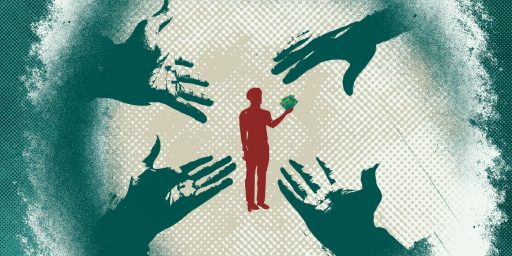The Global 1%
Via the BBC: Richest 1% to own more than rest of world, Oxfam says
The wealthiest 1% will soon own more than the rest of the world’s population, according to a study by anti-poverty charity Oxfam.
The charity’s research shows that the share of the world’s wealth owned by the richest 1% increased from 44% in 2009 to 48% last year.
On current trends, Oxfam says it expects the wealthiest 1% to own more than 50% of the world’s wealth by 2016.
[…]
The charity said the research, published on Monday, showed that 52% of global wealth not owned by the richest 1% is owned by those in the richest 20%.
The remaining population accounts for just 5.5% of global wealth, and their average wealth was $3,851 (£2,544) per adult in 2014, Oxfam found.
That compares with an average wealth of $2.7m per adult for the elite 1%.
More specifics:
The data excludes wages or income.
The BBC’s head of statistics, Anthony Reuben, said in order to be part of the wealthiest 1% of the world’s population, an individual would need to be worth just over half a million pounds.
“So it is not necessarily talking about people who own yachts and ski chalets. Owning an average house in London (without a mortgage) would just about put you in the 1%. ”
He also noted that Oxfam had chosen to use figures which showed the disparity between the 1% and the rest of the world in the worst light.
“From 2000 until 2009, the proportion of wealth held by the wealthiest 1% fell every year. From 2010 until 2014 it rose every year. Oxfam has taken the figures since 2010 and used them to extrapolate what will happen in the coming years. Clearly, that is the methodology that will make inequality look the most severe,” he added.
Also at the link: the obligatory list of really, really rich dudes.






That wealth will start trickling down any moment now…
The long promised Trickle Down should start in earnest in 3…2…1…
@stonetools:
Um…
So, they’re talking about the owners of median-valued homes in most of the San Francisco area, Orange County, and Santa Cruz County. Not Cook County, Illinois but maybe Queens, NY.
Not what most of us would think of as “the rich” but it’s good to know.
@stonetools:
Remarkable Declines in Global Poverty, But Major Challenges Remain
All one has to do is look at birthrates for poor countries to see why. What is amazing is that Europe has pursued a policy (however unintentially) of lower birthrates for the wealth and more assortative mating. It would make sense that wealth would flow to that group rather to children in Pakistan, India, Indonesia, Brazil, or South Africa.
Join the modern world or be poor. But that would be promoting cultural colonialism and we can’t have others around the world adopting the evil capitalist, individualist system that has brought wealth to those beyond the dictator/king, cronies, religious leaders, clan leaders, racial leaders, etc. as was prevalent in the pre-modern world.
@stonetools: @Scott F.: Oh, something’s been trickling down alright.
As for the 1% or the 10% or the smart folks who lived in San Francisco in 1974 and unlike me, stayed there and bought one of those homes and still owns it, now and then I think I’d like to be right there with them.
But it doesn’t take much to realize that my 1977 model 14×60 trailer house (paid for) with two flush toilets and a high speed DSL connection, a 2003 F-150 and ’13 Ford Fusion (both of them are running…today anyway) in the front yard is truly living the High Life compared to a lot of folks in this world.
http://www.shelter20.com/homeless-statistics/
http://water.org/water-crisis/water-facts/water/
http://www.worldenergyoutlook.org/resources/energydevelopment/accesstoelectricity/
@Dave Schuler:
Someone earning full time minimum wage in the US ($15k / year) is in the top 11% of global income. I’m not sure looking at income distribution on an international level is a useful starting point for discussion.
@Stormy Dragon: But this whole article is about worldwide income distribution.
I find the the fact that the 80 richest soon will have as much wealth as the poorest 50% a lot more interesting, and disturbing. The poorest 50% will then be about 3.7 billion people.
This isn’t sustainable and there will be some sort of a correction. Question is if those at the top will see what’s coming and do it voluntarily or if they won’t.
@Pinky:
Yes, and if your starting point is worldwide income, then you’re basically forced into a position that 85% of the US is rich and that most of the American “poor” should be facing massive tax increases so that the resulting money can be given to the real poor in Africa and Asia.
This is so far outside the realm of the possible that I don’t think it’s a useful dicussion.
@PJ: What would make it unsustainable?
http://en.wikipedia.org/wiki/List_of_peasant_revolts
WikiP lists 61 peasant revolts. From the Dazexiang Uprising in 209 bc to 1970’s Thiland. For all those corpses littering the globe over 2200+ years only 2 were successful. The first one and one in India that ended a few years after I was born.
Given these odds and given that you have now stuck your neck out and are predicting the future (…there will be…) please be more specific and give us the who, where, what, why and more specifically the when of your prophesy.
Yes, the rich will get richer and the poor will get… Well, you know what they will get. Meanwhile, the rest of us will get better excuses.
@OzarkHillbilly:
steadily richer, with better access to food, health care, and education. Not to say we can’t mess things up – historically, we always do – but we’re doing better than ever. We’ve had a couple of threads lately about this, how calamity is being oversold in the press.
I don’t think tax cuts have been given a fair chance.
No. The data are about wealth, not wages or income. Presumably wages and income are accounted for to the extent that they affect, you know, wealth.
@Pinky:
No, it isn’t. It’s about worldwide wealth distribution. If you’re not clear on the difference, you could look it up.
I’ve seen some arguments that OxFam’s analysis is bogus. It does seem to churn up some very odd results, I must say.
Is Pres Obama going to excoriate central bankers tomorrow night? Didn’t think so.
@DrDaveT: You’re right; I messed up. So did Stormy, who I was replying to. (I also probably just messed up who/whom.)
@Pinky:
Even if you switch to wealth instead of income, you get a similar result where even people who would be considered extremely poor by American standards qualify as wealthy by global standards. The exact numbers change, but the general point does not.
@Stormy Dragon: Agreed.
@ernieyeball: Given that Wikipedia doesn’t have the Sicilian Vespers mentioned, I’m not too impressed with their list.
(That one won, by the way.)
I can find a WikiP entry for Sicilian Vespers. Don’t know why it is not on the Peasants Revolt page. Maybe there are scales of butchery, bloodletting and disembowelment in play here that we know nothing about.
http://en.wikipedia.org/wiki/Sicilian_Vespers